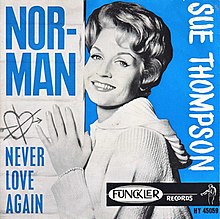
"That'll Be the Day" is a song written by Buddy Holly and Jerry Allison. It was first recorded by Buddy Holly and the Three Tunes in 1956 and was re-recorded in 1957 by Holly and his new band, the Crickets. The 1957 recording achieved widespread success. Holly's producer, Norman Petty, was credited as a co-writer, although he did not contribute to the composition.
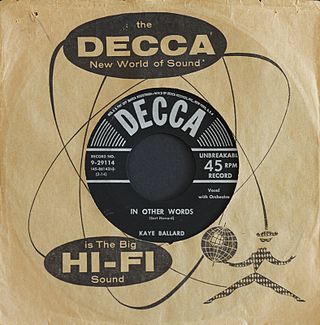
"Fly Me to the Moon", originally titled "In Other Words", is a song written in 1954 by Bart Howard. The first recording of the song was made in 1954 by Kaye Ballard. Frank Sinatra's 1964 version was closely associated with the Apollo missions to the Moon.

"Goodnight, Irene" or "Irene, Goodnight," is a 20th-century American folk standard, written in 3
4 time, first recorded by American blues musician Huddie 'Lead Belly' Ledbetter in 1933. A version recorded by the Weavers was a #1 hit in 1950.

"The Little Drummer Boy" is a popular Christmas song written by American composer Katherine Kennicott Davis in 1941. First recorded in 1951 by the Austrian Trapp Family, the song was further popularized by a 1958 recording by the Harry Simeone Chorale; the Simeone version was re-released successfully for several years, and the song has been recorded many times since. In the lyrics, the singer relates how, as a poor young boy, he was summoned by the Magi to the Nativity of Jesus. Without a gift for the Infant, the little drummer boy played his drum with approval from Jesus's mother, Mary, recalling, "I played my best for him" and "He smiled at me".
"You Are My Sunshine" is a standard of American old-time country music and one of the official state songs of Louisiana. Though its original writer is disputed, according to the performance rights organisation BMI in 2000, the song had been recorded by over 350 artists and translated into 30 languages.
"Blue Moon" is a popular song written by Richard Rodgers and Lorenz Hart in 1934 that has become a standard ballad. Early recordings included those by Connee Boswell and by Al Bowlly in 1935. The song was a hit twice in 1949, with successful recordings in the U.S. by Billy Eckstine and Mel Tormé.
"No Other Love" is a show tune from the 1953 Rodgers and Hammerstein musical Me and Juliet.
"The Poor People of Paris" is a US pop song that became a number-one instrumental hit in 1956. It is based on the French language song "La goualante du pauvre Jean", with music by Marguerite Monnot and words by René Rouzaud. Edith Piaf had one of her biggest hits with the original French version.
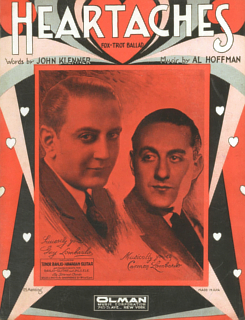
"Heartaches" is a song written by composer Al Hoffman and singer John Klenner and originally published in 1931. A fast-tempo instrumental version of the song by Ted Weems and his Orchestra became a major hit in 1947, topping the Billboard Best Selling Singles chart. Later versions by band leader Harry James and doo-wop group the Marcels were also chart successes. "Heartaches" received renewed attention in the 2010s after several 1930s recordings of the song, including a version by Sid Phillips & his Melodians with Al Bowlly, were sampled in the Caretaker's album Everywhere at the End of Time.
Susan Maughan is an English singer who released successful singles in the 1960s. Her most famous and successful song, "Bobby's Girl", reached number three in the UK Singles Chart at Christmas time in 1962. It also reached number six in the Norwegian chart in that year according to VG-lista 1962.
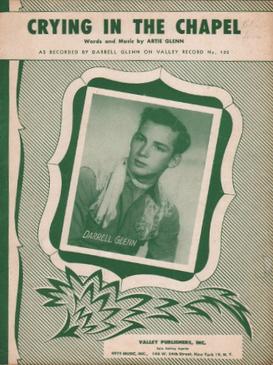
"Crying in the Chapel" is a song written by Artie Glenn and recorded by his son Darrell Glenn. The song was released in 1953 and reached number six on the Billboard chart.
"Charmaine" is a popular song written by Ernö Rapée and Lew Pollack. The song was written in 1926 and published in 1927. However, Desmond Carrington on his BBC Radio 2 programme marked the song's writing as being in 1913.
"Imagination" is a popular song with music written by Jimmy Van Heusen and the lyrics by Johnny Burke. The song was first published in 1940. The two best-selling versions were recorded by the orchestras of Glenn Miller and Tommy Dorsey in 1940.
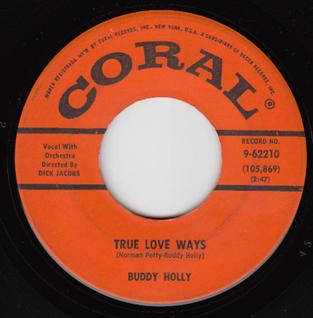
"True Love Ways" is a song attributed to Norman Petty and Buddy Holly. Buddy Holly's original was recorded with the Dick Jacobs Orchestra in October 1958, four months before the singer's death. It was first released on the posthumous album The Buddy Holly Story, Vol. 2, in March 1960. The song was first released as a single in Britain in May 1960, reaching number 25 on the UK Singles Chart. It was released the following month in the US, but did not make the charts. In 1988, a UK re-release of the recording by MCA, the single reached no. 65 on the UK singles chart in a 5 week chart run.

Carol Deene is an English pop singer and radio host who achieved success in the early 1960s.
"Sad Movies (Make Me Cry)" is a 1961 pop song by the American singer Sue Thompson. The song was written by John D. Loudermilk and appears on Thompson's 1962 Hickory Records album Meet Sue Thompson.

"Let's Stick Together" is a blues-based rhythm and blues song written by Wilbert Harrison. In 1962, Fury Records released it as a single. Harrison further developed the song and in 1969, Sue Records issued it as a two-part single titled "Let's Work Together". Although Harrison's original song did not appear in the record charts, his reworked version entered the U.S. Top 40.

"When the Girl in Your Arms Is the Girl in Your Heart" is a 1961 hit by Cliff Richard written by the songwriting team of Sid Tepper and Roy Bennett who would contribute fifteen songs to the Cliff Richard canon including his career record "The Young Ones". Produced by Richard's regular producer Norrie Paramor, "When the Girl in Your Arms..." featured backing by the Norrie Paramor Orchestra. Richard's own group the Shadows backed him on the B-side "Got a Funny Feeling".
Bill Haley & His Comets recorded many singles and albums. The following list references only their original release and generally does not include compilation albums or single reissues. This list does not include releases on which the Comets worked as session musicians, and primarily focuses on releases during Haley's lifetime.

"Johnny Get Angry" is a song written by Hal David and Sherman Edwards and performed by Joanie Sommers. It reached No.7 on the U.S. pop chart in 1962. It was featured on her 1962 album Johnny Get Angry.
